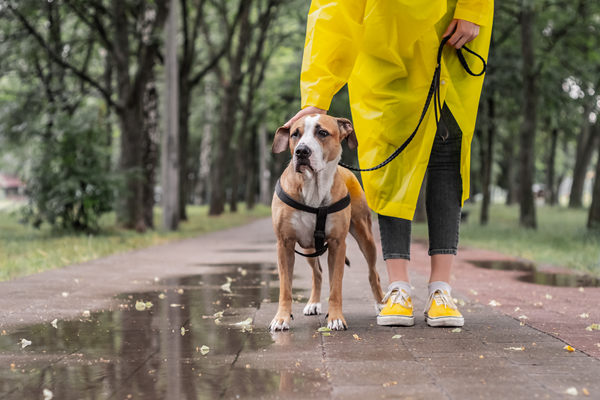
April showers may bring May flowers, but for pet owners, they also bring potential health risks for our furry friends. As the rain falls and the temperatures rise, the risk of dogs becoming infected with organisms like leptospirosis and giardia increases. Understanding these risks and taking proactive measures can help keep our pets safe and healthy during the spring months.
Leptospirosis: The Hidden Danger
Leptospirosis is a bacterial infection caused by the Leptospira bacteria. Dogs can become infected when they encounter water, soil, or mud contaminated with the urine of infected animals, such as rodents or wildlife, especially raccoons. With any increased rainfall, puddles, ponds, creeks, and other wet areas can become prime sources for these bacteria, putting our furry companions – and ultimately ourselves – at risk, as leptospirosis can spread to humans as well.
Signs and symptoms of leptospirosis include:
- Fever
- Muscle pain
- Vomiting
- Diarrhea
- Loss of appetite
- Lethargy
In severe cases, leptospirosis can lead to kidney and liver failure, and in some instances, it can be fatal.
Preventing Leptospirosis
- Vaccination: Ensure your dog is up-to-date on their leptospirosis vaccination.
- Avoid contaminated water: Keep your dog away from stagnant water, puddles, and areas frequented by wildlife.
- Practice good hygiene: Wash your pets’ paws after walks and wash your own hands thoroughly after handling your pet or coming into contact with potentially contaminated water.
Giardia: The Waterborne Menace
Giardia is a protozoan (single-celled) parasite that can infect dogs and cause gastrointestinal upset. Like leptospirosis, giardia thrives in moist environments and is commonly spread through contaminated water sources. Dogs are at risk of contracting giardia when they drink from puddles, rivers, or streams contaminated with the parasite.
Signs and symptoms of giardia infection include:
- Diarrhea
- Vomiting
- Weight loss
- Dehydration
- Lethargy
Preventing Giardia
- Avoid contaminated water sources: Keep your dog away from standing water and discourage them from drinking from puddles or streams.
- Maintain good hygiene: Wash your dog’s paws after walks, especially if they have been in contact with potentially contaminated water.
As the spring rain falls, remember that this wet weather also brings increased health risks. By understanding the dangers of leptospirosis and giardia, and taking proactive measures to prevent infection, you can help keep your pet safe and healthy during the spring months. Be vigilant, stay informed, and enjoy the beauty of the season with your four-legged friend by your side!
